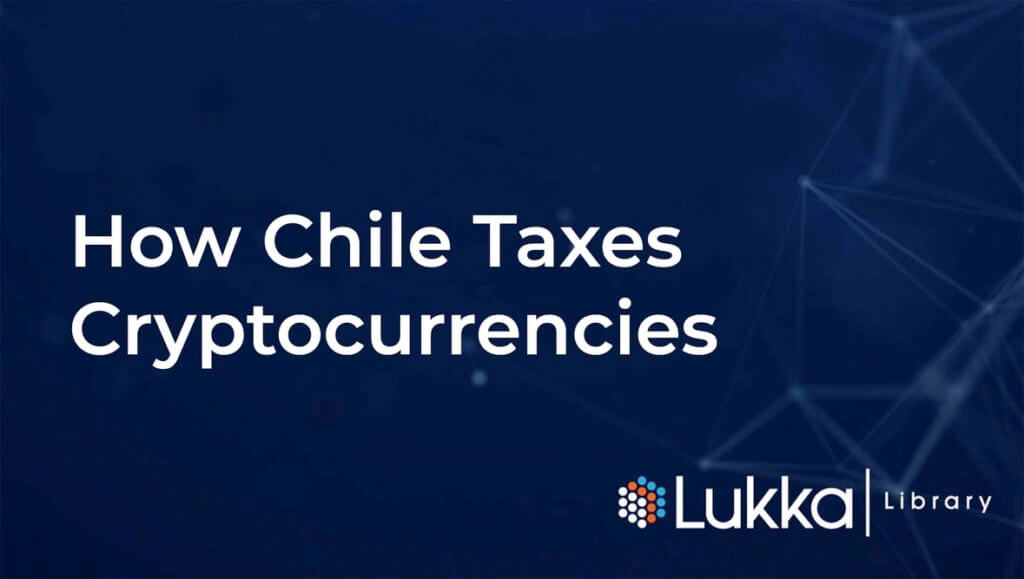Author: Tom Azzopardi, Journalis
Although there is no specific legislation regulating cryptocurrencies in Chile, the country’s financial and tax authorities have begun to discuss the ramifications of this new asset class in a series of policy documents and rulings.
Chile’s financial regulator, the Financial Markets Commission, has ruled that cryptocurrencies are not financial securities and consequently are not subject to the rules regulating this type of asset. They also do not qualify as legal tender or foreign currency, according to the Central Bank. Both entities, as well as the Ministry of Finance’s Financial Stability Council, have warned about the risks of buying and holding cryptocurrencies, given their volatility and the indirect threat they could pose to financial institutions if these lend to individuals or businesses which acquire cryptocurrencies or if cryptocurrency-based derivatives become widespread. The Central Bank has recommended legislation to bring such assets under regulation by the Financial Markets Commission like other financial securities.
Chile’s tax authority Servicio de Impuestos Internos (SII) has issued two guidance documents covering the issue of cryptocurrencies in response to inquiries from anonymous taxpayers.
In the first (No 963/2018), issued in May 2018, SII said that cryptocurrency represented a new form of digital or virtual asset. As such, taxpayers are required to pay income tax on capital gains made through buying and selling cryptocurrencies. The cost of buying the cryptocurrency can be discounted as a cost from the income made from selling a cryptocurrency.
As an incorporeal (intangible) good, cryptocurrencies are not subject to Chile’s Value-Added Tax. However, taxpayers buying and selling cryptocurrencies are required to issue invoices and receipts.
In a second ruling (No 1,474) on the matter issued in August 2020, SII tackled the issue of individual taxpayers buying and selling cryptocurrencies, noting that these accounted for the majority of taxpayers active in this market. The document goes into greater detail about how taxpayers should price transactions involving cryptocurrencies, given their complex nature, whether commissions charged by cryptocurrency exchanges or brokers can be discounted as costs, and whether losses suffered from trading cryptocurrencies can be discounted from other income.
- How are cryptocurrencies taxed in Chile?
In line with the findings of the Central Bank and the Financial Market Commission, SII understands that bitcoin and other cryptocurrencies do not qualify as legal tender or foreign currency under Chilean law. The SII instead describes them as a digital or virtual asset.
According to ruling No. 963/2018, income earned from the sale of cryptocurrencies is classified by Article 20/5 of the Income Tax Law which refers to all income, regardless of its origin, nature or denomination, whose taxation is not covered by any other category and is not declared tax exempt.
It is therefore subject to the taxes covered by this law, including First Category Tax (which applies to businesses) and the Global Complementary Tax (which applies to individuals) and Additional Tax (a withholding tax paid on remittances).
The SII is paying closer attention to transactions in cryptocurrencies. In 2018, SII issued a new form where exchanges and brokers are required to report on an annual basis, transactions realized by their clients, including in cryptocurrencies.
- Are cryptocurrencies subject to VAT?
According to Ruling 963/2018, SII does not consider that the sale of cryptocurrencies subject to Chile’s 19% Value Added Tax as they do not fulfill the requirement of corporeality under Article 2 of the Law on the Tax on Sales and Services.
However, the SII states in the same ruling that taxpayers that do pay Value-Added Tax should issue invoices and receipts when they buy and sell cryptocurrencies.
- When do you have to pay tax on cryptocurrencies?
Income earned from selling cryptocurrencies will be considered for the determination of the taxpayer’s taxable liquid income in the tax year when the transaction was realized.
One is also liable for income tax if one uses cryptocurrencies to acquire goods and services, including other cryptocurrencies, or if one is paid in cryptocurrencies.
- What is the tax rate on capital gains earned from cryptocurrencies?
Unlike other jurisdictions, Chile’s tax code applies the same rate of income tax on income earned through capital gains and most of other forms of income. The income tax rate applicable to capital gains earned from the sale of cryptocurrencies, therefore, depends on the nature of the entity realizing the sale.
Following the 2020 Tax Modernization Law enacted in February 2020, companies adhering to the general corporate regime pay a tax on profits at the rate of 27%. However, many small and medium-sized enterprises (with annual sales of up to Chilean Peso 200 billion or US$2.6 million) can accede to the special SME regime with a tax rate of just 25%. Some companies may also choose to pay tax under a special transparent regime by which no tax is paid at a corporate level but only at the level of the shareholders.
Personal income tax is collected at a marginal rate of between 0.4% (for those earning with an annual taxable income of more than Chilean Peso 8 million) and 35% (for those earning more than Chilean Peso 71 million).
- Can I deduct costs from income earned from cryptocurrencies?
The Chilean tax code allows taxpayers to discount the cost of purchasing an asset from the income earned through its sale. This also applies to cryptocurrencies.
Article 30 of the Income Tax Law requires taxpayers to use the oldest direct cost to determine the amount to be deducted from the income earned from the sale of an asset.
However, in consideration of the complex nature of some transactions involving cryptocurrencies, in Ruling 1474/2020, the SII states that the taxpayers can alternatively opt to use the “weighted average cost”, adding the SII can require the taxpayer either one method or the other.
Taxpayers can also deduct commissions paid to brokers and exchanges when buying and selling cryptocurrencies. However, the commissions constitute general expenses, rather than forming part of the tax cost for the sale of assets.
- Are there any requirements for claiming the cryptocurrency cost deduction?
In order to claim a cost deduction for cryptocurrency purchases, the taxpayer must present either an invoice or receipt (which the seller is obliged to provide – see below). Alternatively the taxpayer may present an electronic transfer receipt.
In order to calculate the taxable profit of each sales transaction, one must subtract from the sales price the initial purchase price multiplied by the corresponding variation in the Consumer Price Index. The result must be adjusted in line with the variation in the CPI between the last day of the month prior to that in which the sale was realized and November 31st of the respective tax year.
In line with Article 41 of the Income Tax Law, the taxpayer must also report which cryptocurrencies acquired during the year are being sold.


